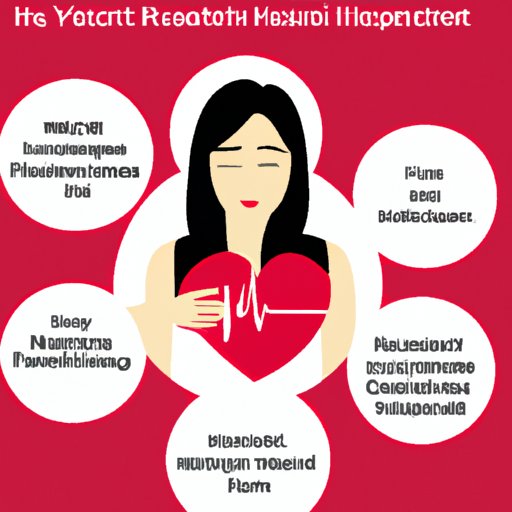
Introduction
Hypertensive heart disease is a condition in which high blood pressure puts strain on the heart, leading to a variety of potential complications. This condition is incredibly common, affecting an estimated 1 in 3 adults in the United States. Despite its prevalence, many people are unaware of the risks associated with hypertensive heart disease and how to manage it effectively. In this article, we’ll explore all of the key topics related to this condition, including its definition, symptoms, treatments, and preventative measures.
The Silent Killer: Understanding Hypertensive Heart Disease
Hypertensive heart disease is a type of heart disease caused by high blood pressure. This condition is distinct from other forms of heart disease because it is caused specifically by hypertension. Hypertension is a chronic condition in which the pressure within the arteries is elevated, putting increased strain on the heart and other organs over time. As a result, individuals with hypertension are at increased risk of developing heart disease over time.
There are a number of different risk factors associated with the development of hypertensive heart disease. These can include age, family history, sedentary lifestyle, poor diet, smoking or other tobacco use, and a range of other factors. Additionally, many people with hypertension do not experience symptoms until the condition has progressed significantly. As a result, hypertensive heart disease is known as “the silent killer,” as it can go undetected for years or even decades.
Living with Hypertensive Heart Disease: Managing Your Symptoms
Fortunately, there are a variety of different treatments available to individuals with hypertensive heart disease. These treatments can range from lifestyle changes to medications or other interventions. In many cases, a combination of different approaches is required in order to effectively manage this condition.
One of the simplest and most effective lifestyle changes that can be made to manage hypertensive heart disease is adopting a heart-healthy diet. This can include foods that are high in fiber, lean protein, and healthy fats, while limiting intake of salt, sugar, and unhealthy fats. Physical activity can also be incredibly helpful, as regular exercise can help to reduce blood pressure and improve overall heart health. Additionally, individuals with hypertensive heart disease may benefit from stress management techniques such as relaxation exercises or meditation.
Medications can also be used to manage hypertensive heart disease. There are a variety of different medications available, each of which can be used to address a different aspect of the condition. One common class of medications used to manage hypertension is ACE inhibitors, which work by relaxing blood vessels and reducing the workload on the heart. Other medications may be prescribed specifically to treat the symptoms associated with hypertensive heart disease.
Preventing Hypertensive Heart Disease: What You Need to Know
Perhaps the most impactful aspect of managing hypertensive heart disease is taking steps to prevent the condition from developing in the first place. This can include making changes to various lifestyle factors that are known to contribute to hypertension or heart disease. This can include eating a healthy diet, getting regular exercise, quitting smoking or other tobacco use, and reducing stress levels.
Additionally, regularly monitoring blood pressure can be incredibly helpful in preventing the development of hypertensive heart disease. Individuals who are at increased risk of developing hypertension or heart disease may benefit from regular check-ins with a healthcare professional, who can monitor blood pressure and assess overall heart health.
The Link Between Hypertensive Heart Disease and Stroke
One important factor to consider when managing hypertensive heart disease is the link between this condition and stroke. Stroke is a serious condition in which the blood supply to the brain is compromised, leading to long-term complications such as paralysis, speech difficulties, or cognitive impairment. Individuals with hypertensive heart disease are at increased risk of strokes, as hypertension can contribute to the narrowing of blood vessels and other complications that can lead to a stroke.
Fortunately, the same approaches that are effective in managing hypertensive heart disease can also be helpful in preventing stroke. Regular exercise, healthy eating, and stress management can all help to reduce the risk of stroke in individuals with hypertensive heart disease.

Hypertensive Heart Disease in Women: Unique Risk Factors and Symptoms
It is important to note that hypertensive heart disease may present differently in women than in men. For example, women who experience hypertensive heart disease may be more likely to have subtle symptoms that are less obvious than those experienced by men. Additionally, there are certain risk factors that are uniquely relevant to women, such as pregnancy-related hypertension.
As a result, it is important for women to be aware of their risk factors for hypertensive heart disease and to communicate any concerns to their healthcare provider. Women who are at increased risk of developing this condition may benefit from regular heart health screenings and monitoring.
The Role of Diet and Exercise in the Treatment of Hypertensive Heart Disease
One of the most effective ways to manage hypertensive heart disease is by making changes to one’s diet and exercise routine. This can include adopting a heart-healthy diet that is rich in lean protein, healthy fats, and whole grains, while limiting salt, sugar, and unhealthy fats. Regular exercise is also incredibly helpful, as it can help to reduce blood pressure and improve overall heart health.
There are a variety of different types of exercise that can be beneficial for individuals with hypertensive heart disease. For example, low-impact exercises such as walking or swimming may be helpful for individuals who are new to exercise or have joint pain. Yoga or other relaxation exercises can also be particularly helpful for managing stress levels and reducing overall blood pressure.
Living Your Best Life with Hypertensive Heart Disease: Tips from Real Patients
Finally, it can be incredibly helpful to hear from individuals who have successfully managed hypertensive heart disease. Talking to other patients can provide valuable insights into the challenges associated with this condition and the strategies that can be used to manage it effectively.
Some useful tips from real patients may include things like developing a strong support system of friends and family members, adopting a positive mindset, and staying active and engaged in one’s own care. Other patients may offer suggestions for managing specific symptoms or finding ways to incorporate healthy habits into one’s daily routine.
Conclusion
Overall, hypertensive heart disease is a common and potentially serious condition that requires careful attention and management. By making changes to one’s diet, exercise routine, and other lifestyle factors, it is often possible to effectively manage this condition and reduce the risk of complications. Additionally, individuals who are at increased risk of developing hypertensive heart disease should work closely with a healthcare professional to monitor their blood pressure and overall heart health.





